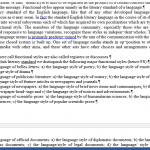Тема эссе: Билеты по стилистике английского (дополненные)
или
Заказать новую работу(фрагменты работы)
| Учебное заведение: | Другие города > ДРУГОЕ |
| Тип работы: | Эссе |
| Категория: | Английский язык |
| Год сдачи: | 2016 |
| Количество страниц: | 31 |
| Оценка: | 5 |
| Дата публикации: | 16.06.2018 |
| Количество просмотров: | 992 |
| Рейтинг работы: |
ВОПРОСЫ К ЭКЗАМЕНУ ПО СТИЛИСТИКЕ АНГЛИЙСКОГО ЯЗЫКА
1. Stylistics as a branch of
linguistic science. The notion of style. Literary stylistics and
linguo-stylistics.
2. Expressive means and stylistic
devices.
3. Stylistic classification of the
English vocabulary.
4. Terms.
5. Poetic words.
6. Archaic words.
7. Barbarisms and foreign words.
8. Literary coinages (including
nonce-words).
9. Slang.
10. Jargonisms. Professionalisms.
11. Dialectal words. Territorial varieties of English.
12. Vulgar words. Colloquial coinages (nonce-words).
13. The belles-lettres style.
14. The publicistic style.
15. The newspaper style.
16. Scientific prose style.
17. The style of official documents.
18. Types of lexical meaning.
19. Metaphor. Personification.
20. Metonymy. Synecdoche.
21. Irony. Zeugma and pun.
22. Epithet. Classification of epithets.
23. Oxymoron. Antonomasia.
24. Simile. Allusion.
25. Periphrasis. Types of periphrasis. Euphemism.
26. Hyperbole. Understatement.
27. Stylistic inversion. Ellipsis.
28. Parallel constructions and their types. Chiasmus.
29. Repetition and its types.
30. Enumeration. Suspense.
31. Climax. Anticlimax.
32. Antithesis. Litotes.
33. Asyndeton. Polysyndeton. The gap-sentence link. Detached
constructions.
34. Break-in-the-narrative. Question-in-the-narrative.
Rhetorical questions.
35. Represented speech. Uttered represented speech. Inner
represented speech.
36. Phonetic expressive means and stylistic devices.
(фрагменты работы)
Билет 5.
Poetic words form a rather insignificant layer of the special literary vocabulary. They are mostly archaic or very rarely used highly literary words which aim at producing an elevated effect. They have a marked tendency to detach themselves from the common literary word-stock and gradually assume the quality of terms denoting certain definite notions and calling forth poetic diction.
Poetic words and expressions are called upon to sustain the special elevated atmosphere of poetry. This may be said to be the main function of poetic words.
Poetical tradition has kept alive such archaic words and forms as yclept (p. p. of the old verb clipian—to call, name); quoth (p. t. of owed-an — to speak); eftsoons (eftsona,— again, soon after), which are used even by modern ballad-mongers.
It must be remembered though, that not all English poetry makes use of "poeticisms or poetical terms", as they might be named. In the history of English literature there were periods, as there were in many countries, which were characterized by protests against the use of such conventional symbols. The literary trends known as classicism arid romanticism were particularly rich in fresh poetic terms. Poetical words in an ordinary environment may also have a satirical function.
Poetical words and word-combinations can be likened to terms in that they do not easily yield(приносить урожай) to polysemy. They are said to evoke emotive meanings.
In modern English -poetry there is a strong tendency to use words in strange combinations. It manifests itself in the coinage of new words and, most of all, in combining old and familiar words in a way that hinders understanding and forces the reader to stop and try to decipher the message so encoded.
Похожие работы
-
1 страниц |300 ₽
-
1 страниц |500 ₽
-
7 страниц |500 ₽
-
1 страниц |150 ₽
-
1 страниц |150 ₽
-
3 страниц |500 ₽
Работы автора
-
30 страниц |400 ₽
-
29 страниц |400 ₽
-
25 страниц |1500 ₽
-
51 страниц |2500 ₽
-
13 страниц |300 ₽
